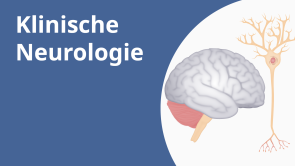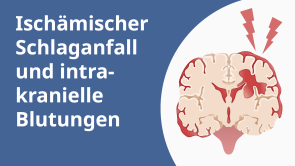Schlaganfall: Pharmakologische Prävention

Über den Vortrag
Der Vortrag „Schlaganfall: Pharmakologische Prävention“ von Roy Strowd, MD ist Bestandteil des Kurses „Ischämischer Schlaganfall und intrakranielle Blutungen“.
Quiz zum Vortrag
What is primary stroke prevention?
- Measures to reduce the risk of stroke in individuals with no history of stroke but who are at high risk for stroke
- Treatment of individuals who have had a stroke or a TIA and are at risk for a future event
- Large-scale prevention of stroke at a population level
- The use of pharmacologic therapy to prevent stroke
- The implementation of lifestyle modifications to prevent stroke
Which of the following is NOT an antiplatelet medication used to prevent strokes?
- Heparin
- Aspirin
- Clopidogrel
- Ticagrelor
- Dipyridamole
What is the advantage of direct oral anticoagulants (DOACs) over warfarin?
- There is no need for frequent monitoring and there are fewer drug-drug interactions.
- Warfarin requires dosing multiple times a day.
- DOACs require only once-weekly dosing.
- There is no significant difference between the two agents.
If a patient were to present with a watershed infarct, which therapeutic intervention would be the most appropriate?
- IV fluids
- Aspirin
- Clopidogrel
- Warfarin
- Low-molecular-weight heparin
What is the mechanism of action of clopidogrel?
- It is a P2Y12 inhibitor that blocks ADP receptors.
- It is a COX and thromboxane A2 inhibitor.
- It increases plasma adenosine.
- It increases platelet phosphodiesterase.
- It increases platelet aggregation.
What are some of the common side effects of aspirin and extended-release dipyridamole (ASA–ERDP)?
- Headache and GI upset
- Fevers and hepatosplenomegaly
- Lymphadenopathy and GI bleeding
- Nausea and serum sickness reaction
- Myalgias and LFT elevations
What is the major side effect to consider in patients taking dual antiplatelet therapy?
- Increased risk of CNS and systemic bleeding
- Increased risk of LFT elevations
- Pulmonary toxicity
- Hypothyroidism
- Increased risk of myocardial infarction
What is the mechanism of action of cilostazol?
- Phosphodiesterase inhibitor
- P2Y12 inhibitor
- TXA2 inhibitor
- COX inhibitor
- Leukotriene inhibitor
Diese Kurse könnten Sie interessieren
Kundenrezensionen
5,0 von 5 Sternen
| 5 Sterne |
|
5 |
| 4 Sterne |
|
0 |
| 3 Sterne |
|
0 |
| 2 Sterne |
|
0 |
| 1 Stern |
|
0 |






